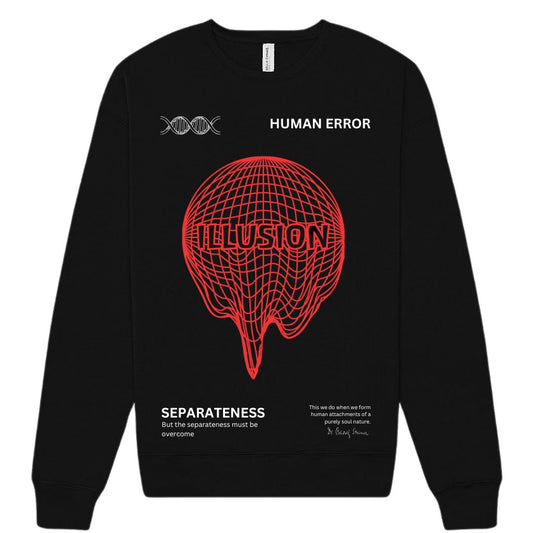-
Eternal Being | Esoteric Apparel | Embroidered Soft Sweatshirt
Regular price $59.00 USDRegular priceUnit price / per$71.00 USDSale price $59.00 USDSale -
Four Sights of the Buddha Sweatshirt | Premium Soft Sweatshirt
Regular price $59.00 USDRegular priceUnit price / per$71.00 USDSale price $59.00 USDSale -
Ganesha Statue Sweatshirt
Regular price $59.00 USDRegular priceUnit price / per$71.00 USDSale price $59.00 USDSale -
Helena Blavatsky Research Support | Theosophical Wisdom Studies
Regular price $30.00 USDRegular priceUnit price / per$36.00 USDSale price $30.00 USDSale -
Hermetic Consciousness Research Support | As Above So Below Studies
Regular price $30.00 USDRegular priceUnit price / per$36.00 USDSale price $30.00 USDSale -
Illusion of Separateness | Esoteric Sweatshirt
Regular price $59.00 USDRegular priceUnit price / per$71.00 USDSale price $59.00 USDSale -
Soul Calling Esoteric Tshirt
Regular price $34.00 USDRegular priceUnit price / per$40.00 USDSale price $34.00 USDSale -
The Four Sights Tshirt
Regular price $30.00 USDRegular priceUnit price / per$36.00 USDSale price $30.00 USDSale
Collection: Support Theosophy Research...
Supporting Theosophy Research Through Meaningful Wear
Your contribution advances understanding of theosophy's synthesis of Eastern and Western wisdom traditions
🔬 Our Research Focus
This collection supports ongoing research into theosophical principles and their role in bridging diverse wisdom traditions. Each piece represents specific aspects of the "divine wisdom" that theosophy reveals as universal truth appearing across cultures and epochs.
💎 Contribution Transparency
70% Research Funding: Directly supports theosophy studies, comparative religion research, and making synthesis wisdom accessible
30% Sustainable Creation: Ethical production honouring the universal principles theosophy teaches
Impact: Your support has funded research reaching 78,000+ seekers monthly, investigating how theosophical insights bridge Eastern mysticism with Western philosophy.
Theosophy: Divine Wisdom Across Traditions
What Is Theosophy?
Theosophy, meaning "divine wisdom," represents a comprehensive system for understanding the spiritual principles underlying all religions and wisdom traditions. Founded by Helena Blavatsky, Henry Steel Olcott, and William Quan Judge in 1875, theosophy seeks to discover the universal truths that appear in various forms across cultures.
Our research investigates how theosophical principles provide frameworks for understanding consciousness evolution, spiritual development, and the synthesis of ancient and modern wisdom.
The Three Objects of the Theosophical Society
Universal Brotherhood
To form a nucleus of the universal brotherhood of humanity, without distinction of race, creed, sex, caste, or colour. Our research documents how this principle anticipates modern understanding of human unity and global consciousness.
Comparative Study of Religion and Philosophy
To encourage the comparative study of religion, philosophy, and science. Theosophy pioneered the academic field of comparative religion, seeking universal principles across traditions.
Investigation of Unexplained Laws
To investigate unexplained laws of nature and the powers latent in humanity. This object bridges ancient wisdom with modern consciousness research and parapsychological studies.
Key Theosophical Principles
The Ancient Wisdom
Theosophy teaches that an "Ancient Wisdom" or "Perennial Philosophy" underlies all religions and appears in various cultural forms. Our research investigates how this wisdom manifests across traditions:
Eastern Contributions:
- Hindu concepts of karma, reincarnation, and dharma
- Buddhist understanding of consciousness and liberation
- Taoist insights into natural harmony and wu wei
- Vedantic non-dualism and Atman-Brahman unity
Western Contributions:
- Platonic philosophy and ideal forms
- Neoplatonic emanation and return to Source
- Hermetic principles and alchemical transformation
- Christian mysticism and gnosis
Helena Blavatsky: Pioneer of Consciousness Studies
Revolutionary Synthesis
Blavatsky's work predated and influenced many developments in consciousness research, comparative religion, and depth psychology. Her investigations into Eastern philosophy introduced concepts that later became central to Western spiritual and psychological understanding.
"The Secret Doctrine" presents a cosmological and anthropological system that anticipates modern theories about consciousness evolution and the relationship between mind and matter.
"Isis Unveiled" offers comprehensive analysis of ancient mysteries and their relevance to modern spiritual and scientific inquiry.
Rudolf Steiner and Anthroposophy
From Theosophy to Spiritual Science
Rudolf Steiner's early involvement with theosophy led to his development of anthroposophy, which applies theosophical insights through rigorous spiritual scientific method. Our research documents the continuity between theosophical principles and anthroposophical practice.
Contemporary Research Applications
How Theosophy Informs Modern Studies
Our ongoing research investigates how theosophical insights apply to contemporary challenges:
- Consciousness Studies: How theosophical understanding of consciousness levels aligns with modern research
- Comparative Religion: Applying theosophical methods to interfaith dialogue and understanding
- Transpersonal Psychology: How theosophical insights inform approaches to spiritual development
- Global Ethics: Universal brotherhood principles in addressing planetary challenges
- Educational Innovation: Holistic approaches based on theosophical understanding of human development
Our Collection Features
- Helena Blavatsky wisdom - Symbols and insights from Secret Doctrine teachings
- Universal brotherhood designs - Visual representations of human unity principles
- Ancient Wisdom symbols - Traditional emblems from various wisdom traditions
- Synthesis patterns - Designs showing unity underlying diversity
- Consciousness evolution themes - Representations of spiritual development stages
- Theosophical Society emblems - Historical symbols and meanings
Theosophical Symbolism
The Seal of the Theosophical Society
The theosophical seal combines symbols from multiple traditions:
- Ouroboros: The serpent eating its tail, representing eternal return and cycles
- Interlaced Triangles: Union of spirit and matter, divine and human
- Ankh: Egyptian symbol of life and spiritual vitality
- Om/Aum: Sacred sound representing universal consciousness
- Swastika: Ancient symbol of good fortune and cosmic cycles
Research Partnerships
Collaborative Studies
Our theosophy research collaborates with:
- Comparative religion departments studying universal wisdom principles
- Consciousness research institutes investigating spiritual development
- Transpersonal psychology programs exploring theosophical insights
- Interfaith organizations applying theosophical understanding to dialogue
- Wisdom tradition preservation societies maintaining ancient teachings
Join Our Research Community
When you support this collection, you become part of a global community dedicated to understanding and applying theosophical wisdom through rigorous research. Your contribution enables:
- Research into theosophy's synthesis of wisdom traditions
- Educational resources bridging Eastern and Western philosophy
- Digital archives making theosophical texts accessible
- Community programs exploring universal wisdom principles
- Academic partnerships studying comparative religion and consciousness
- Translation projects making theosophical wisdom available globally
🌟 Community Impact
Together, we've achieved:
- Funded research reaching 88,000+ seekers monthly with synthetic wisdom
- Created educational materials for 20+ interfaith and academic programs
- Supported comparative religion studies documenting universal principles
- Built digital resources making theosophical literature accessible to modern seekers
- Facilitated research partnerships between wisdom traditions and academic institutions
Explore Related Research Areas
Discover more synthesis wisdom through our specialized collections:
- Rudolf Steiner Research Support - Anthroposophical spiritual science
- Hermetic Research Support - Universal principles and ancient wisdom
- Esoteric Research Support - Comprehensive wisdom tradition studies
- Eastern Philosophy Research - Buddhist, Hindu, and Taoist wisdom
Why This Matters Now: In our age of religious division and cultural fragmentation, theosophical principles provide frameworks for recognizing the universal wisdom that unites all traditions. Through this collection, we're not just wearing symbols—we're supporting research into the synthesis that reveals our fundamental unity while honouring our beautiful diversity.








